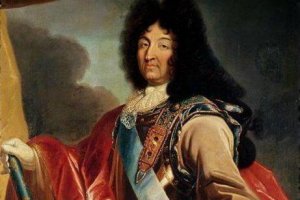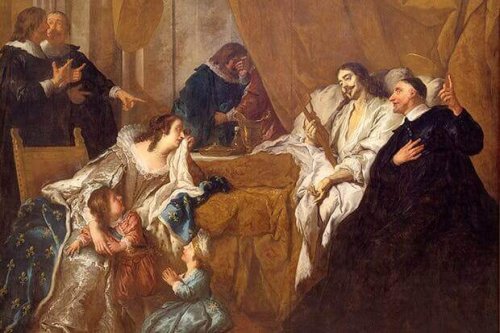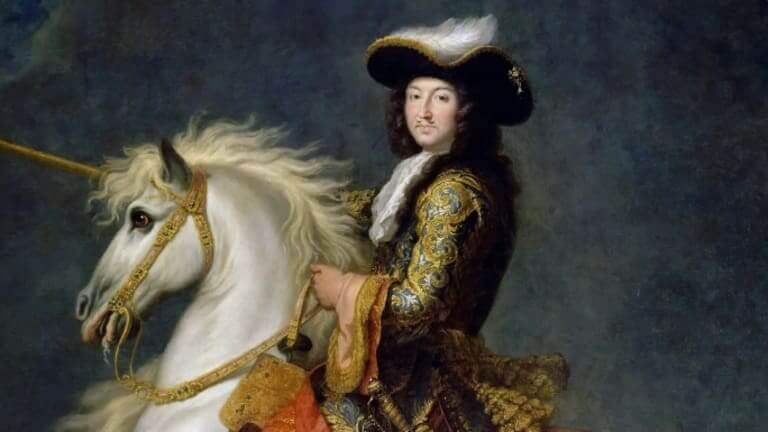Louis XIV: Biography of the Sun King

Louis XIV was the son of King Louis XIII of France and his wife Queen Anne of Austria. Louis XIII and Anne tried to have children for many years before Louis XIV was finally born on September 5, 1638. He was baptized as Louis-Dieudonné. His long-awaited arrival was considered a blessing, which is why they chose his name, which means “Gift from God” in French.
Louis XIV grew up believing that his existence was a divine gift. This belief became especially relevant in the future when a young Louis XIV became convinced that anyone who disobeyed the king was disobeying God. He believed, as many people around him, that his orders were divine commands.
Over the years, Louis XIV acquired the nickname ‘Sun King’. He’s undoubtedly one of the most iconic kings in human history. So what was the secret to his long reign? Did his belief in his own divine origin influence his politics? In this article, we’ll discover this French king who was a perfect example of absolute monarchy.

A troubled childhood
When Louis XIV was only four years old, he became the king of France. According to the French laws at the time, from that moment on, the boy king would be the owner and lord of the bodies and properties of 19 million individuals.
Louis XIV was obviously too young to ascend to the throne at that time, so his mother, Anne of Austria, became Queen Regent. She assigned Cardinal Jules Mazarin as the Prime Minister to supervise government decisions until Louis XIV was of age.
His teachers focused on educating him about politics and the economy. When he was still a boy, he had an accident and nearly drowned. People blamed his mother for not being attentive enough. Louis XIV certainly experienced a fair share of adversity starting at a very young age. It comes as a surprise to no one that there were plenty of people who didn’t want Louis XIV to reach adulthood.
When Louis XIV was nine years old, the nobles of the French Parliament rebelled against the crown and Prime Minister Mazarin. This was the beginning of a long civil war, known as “Fronde.” During this period of his life, Louis XIV suffered humiliation, poverty, fear, cold, and hunger.
This war shaped the monarch’s character and transformed his thinking and his actions. Consequently, Louis XIV never forgave Paris, the nobles, or the people who supported them.
Mazarin eventually won the conflict and started an economic and administrative reform that Louis XIV would finish during his reign. Louis greatly admired the Cardinal and actually let him keep his position as the Prime Minister when he became old enough to wear the crown.
Louis was educated to be a diplomat, but also a soldier. He understood the political inner-workings of his country perfectly. That’s why Louis XIV agreed to marry the King of Spain’s daughter instead of the woman he loved. It was an arranged marriage to keep the peace between France and Spain and increase French control in Europe.

The beginning of his reign: France after Mazarin
After Mazarin’s death, Louis XIV decided to take on all government responsibilities. This decision surprised some of his advisors and all of the nobles because the King was traditionally a more social figure. But Louis, sure of his divine right, defended his position as the absolute power in France. Louis XIV established a regime that would last for centuries in many parts of Europe.
For 54 years, Louis XIV dedicated 10 hours a day to running his kingdom. No detail was too small. Louis didn’t delegate anything, he controlled everything.
The king knew that his kingdom’s greatest weakness was the nobility, which could easily turn against him as they did during the Fronde. To prevent that from happening, Louis XIV brought all nobility to live in Versailles, his immense palace outside the city. They all constantly tried to win the king’s favor.
The set-up made it easy for King Louis XIV to maintain control. He had a large ring of spies who kept him informed about any plans the nobility had against the crown.
Versailles was the epitome of centralized government. It was also a beacon of culture and learning for many decades.
Louis XIV: Solider and benefactor
Louis XIV was a supporter and benefactor of the arts. He was the patron of great literary figures such as Molière, the influential playwright. Louis created the Académie des Inscriptions et Belles-Lettres and the Académie Royale de Musique. He was also the primary benefactor of the Paris Observatory.
Of course, Louis XIV was also the patron and benefactor of many of France’s most important artists. These artists sang, acted, and painted at Versailles. The gardens at Versailles are perhaps one of the biggest open-air works of art in all of France. In spite of the grandeur of the king and his palace, the monarchy became more and more isolated from people and art. Consequently, it was relegated to palace life.
France was a self-sufficient nation, but its king was still a soldier at heart. Louis XIV decided to invade Holland and reclaim French territory in a failed mission. Shortly thereafter, France went to war against the Great Alliance, a group made up of Spain, Great Britain, and the Holy Roman Empire.
Although France didn’t lose too much territory due to the war, they did struggle financially. Their banks were sapped. Louis XIV had gone from being the king of a wealthy nation to reigning a weak and miserable land plagued by poverty.
Louis XIV died a few days after his 77th birthday. Living that long was very unusual at the time. He was one of the longest-living kings of that day and age. After his death, the throne passed to the last son of the Duke of Burgundy, who was only five years old at the time.
Louis XIV was a great king and people still admire him for his contributions to art and culture. However, he also became a living incarnation of absolutism. He believed deeply in the old world values that your destiny and nature are determined from the moment you’re born.
Louis XIV brought splendor and wealth to his country, but he also ruined it. The Sun King was and will continue to be an iconic figure in the history of France.
All cited sources were thoroughly reviewed by our team to ensure their quality, reliability, currency, and validity. The bibliography of this article was considered reliable and of academic or scientific accuracy.
- Lossky, A. (1994) Luis XIV y la monarquía Francesa. Nueva Jersey: Rutgers University.
This text is provided for informational purposes only and does not replace consultation with a professional. If in doubt, consult your specialist.








